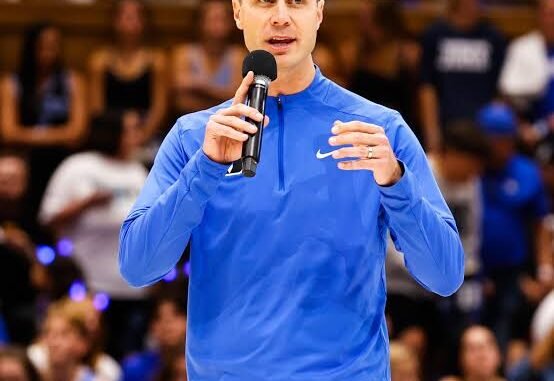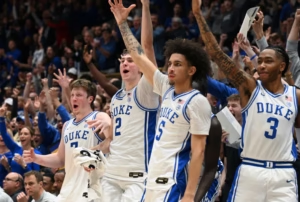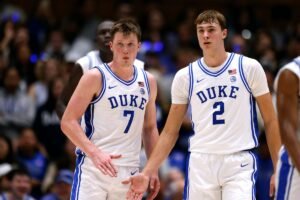
Duke Sends a Bold Message with Coaching Hire: A Championship Standard That Refuses to Fade
In the ever-changing world of college basketball, where coaching changes and player movement dominate headlines, the Duke Blue Devils are reminding the nation that some programs don’t just evolve—they elevate. After a stellar 2024–25 season in which the team finished 35-4, captured the ACC Tournament championship, and made its 18th trip to the Final Four, Duke is once again making a major statement. This time, it’s not about a five-star recruit or a buzzer-beater—it’s about a homegrown leader returning to strengthen the foundation.
On Friday, Duke officially announced the hiring of Tyler Thornton, a former Blue Devil standout and team captain from 2010 to 2014, as an assistant coach. For those who follow the program closely, this wasn’t just a feel-good reunion. It was a message—loud, clear, and deeply strategic. Duke isn’t merely upholding its championship culture; it’s reinforcing it with voices that have lived it, bled for it, and now return to shape the next generation.

Jon Scheyer’s Vision: Building the Future with Duke DNA
Head coach Jon Scheyer, now entering his third season at the helm of the Blue Devils, understands that championship programs are not sustained by talent alone. Culture, loyalty, and legacy are equally critical. In hiring Thornton, Scheyer has taken another calculated step toward ensuring that Duke remains more than just a historical powerhouse. It remains a present-day contender—and a future dynasty.
Scheyer’s comments on the hire were both personal and purposeful. “I’m thrilled to welcome Tyler back to Duke,” Scheyer said in a formal release. “Having coached him during his playing career, I saw firsthand his exceptional basketball IQ, relentless competitiveness, and natural leadership. He’s a winner in every sense—someone who brings out the best in those around him. We’re fortunate to have him home.”
It’s worth noting that Scheyer and Thornton share more than just time in a Duke jersey. They were part of the same championship culture under Mike Krzyzewski. That background has created an unspoken standard between them: the bar at Duke doesn’t move based on trends or pressure. It remains fixed at “championship or bust.”
Thornton’s Role: Not Just a Symbol, but a Strategic Piece
While some might see Thornton’s return as symbolic—a nostalgic choice or a sentimental nod to tradition—it’s far more intentional than that. Thornton has been coaching since his playing days ended, most recently building his résumé as an assistant at Howard University, where he played an integral role in recruiting and player development. His career path has prepared him for this step, and now he brings that experience back to Durham with an insider’s understanding of what makes Duke basketball thrive.
“For me, it’s incredibly humbling to return to the program as a member of the coaching staff,” Thornton shared. “I’m grateful for the opportunity to help the next generation of players achieve their dreams. My passion for the game has always been rooted in doing whatever it takes to win. I’m ready to support Coach Scheyer and contribute in any way that helps our program continue to compete at a championship level.”

These words echo the sentiment that Duke isn’t chasing wins for accolades alone. They’re building winners, on and off the court. Thornton represents the bridge between eras—between the foundation laid by Coach K and the future being carved by Scheyer.
Why It Matters: A Culture of Continuity in a Sport of Chaos
College basketball today is defined by turnover. Coaches leave for bigger jobs. Players transfer for more playing time or NIL opportunities. Even blueblood programs are struggling to maintain identity amidst the whirlwind of change. Yet, Duke has continued to present a rare example of cultural consistency.
What separates Duke is not just talent—it’s a sustained identity. The return of Thornton reinforces that identity. It tells incoming recruits that Duke isn’t just about NBA pipelines or highlight reels. It’s about discipline, sacrifice, and a collective drive to hang banners.
In an age where high-major programs scramble to reinvent themselves year after year, Duke continues to look inward. Hiring former players is not a novelty—it’s a method. It shows that Duke believes the strongest voices in the room are those who have already walked the path.
Thornton the Player: A Blueprint for the Role Player Who Wins
Statistically, Thornton wasn’t a superstar in his college days. Over four seasons, he averaged 3.1 points, 1.7 rebounds, and 1.9 assists per game. But stats can’t measure the value of toughness, vocal leadership, or game-defining grit. Thornton was the player who defended the other team’s best guard. He was the player who dove for loose balls, who took charges, who made the extra pass. In a program full of McDonald’s All-Americans and future pros, Thornton carved his role through relentless effort.
Now, as a coach, those same values become his calling card. And that’s not by accident. It’s those intangibles—effort, leadership, and selflessness—that Duke wants its young players to absorb. That’s the type of character that wins titles.
Looking Ahead: Duke’s Championship Window Is Wide Open
Thornton joins a staff that already includes Chris Carrawell, Jai Lucas, and Amile Jefferson—all with deep ties to elite college basketball. This group isn’t just experienced; it’s intentionally constructed. Each coach brings a different layer of experience—NBA development, high-level recruiting, defensive strategy, and now, with Thornton, a true glue-guy mentality that’s invaluable in March.
Duke’s 2025 NCAA Tournament run was impressive, featuring wins over Mount St. Mary’s, Baylor, Arizona, and Alabama. Despite a tough semifinal loss to Houston, the team proved it has the talent, poise, and coaching leadership to compete at the highest level. With Thornton now on the bench, that leadership deepens.
The Blue Devils return several key players next season and have reloaded with a top-tier recruiting class. With Thornton helping shape that talent, expectations will be sky-high once again—and rightfully so. Championship programs don’t fear pressure. They embrace it.
The Bigger Picture: A Blueprint for Sustained Greatness
By bringing Thornton home, Duke is reinforcing a model that many programs aspire to but few achieve. This move is about sustainability. Duke is showing that success isn’t just about this season’s roster or next year’s prospects. It’s about instilling a mindset that carries over year after year. That mindset—rooted in accountability, toughness, and legacy—is exactly what Thornton represents.
In a broader sense, this hire speaks to the strength of Duke’s internal pipeline. The program doesn’t just produce great players—it produces future coaches, leaders, and culture builders. That’s what makes Duke more than a team. It’s a fraternity of excellence that spans generations.
Conclusion: A Loud and Clear Message from Durham
Duke’s decision to hire Tyler Thornton is more than a personnel move. It’s a powerful declaration: the standard in Durham hasn’t changed—and it never will. In a sport that’s constantly shifting, Duke remains rooted in values that win championships. Tradition, continuity, and leadership from within.
The Blue Devils aren’t just chasing their sixth national title. They’re showing the world how it’s done—with intentionality, with loyalty, and with a championship mindset that never wavers. Tyler Thornton’s return is proof that at Duke, greatness isn’t just remembered. It’s reloaded.
Leave a Reply